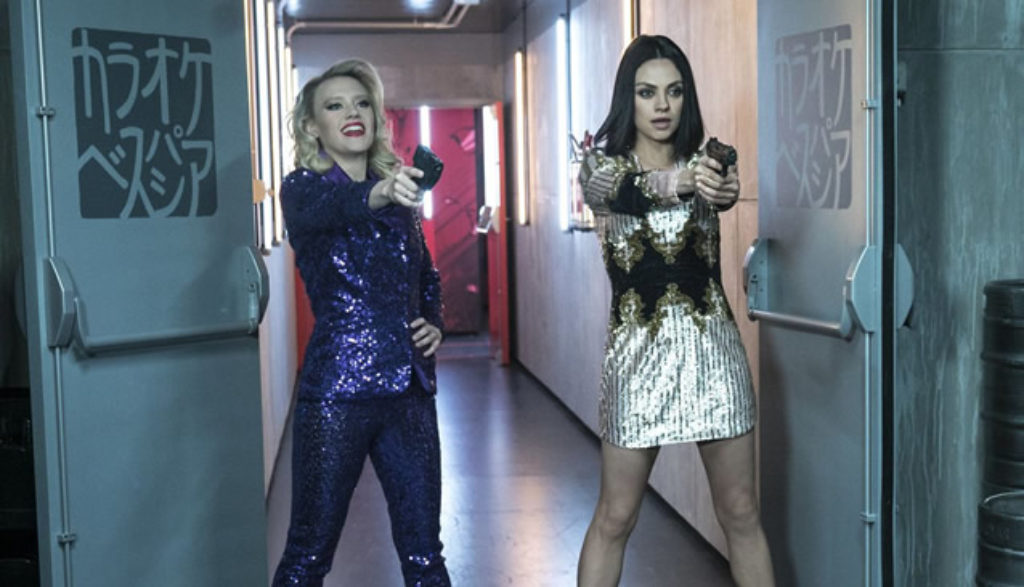
What would you do if you woke up one morning and found out your boyfriend was a spy? What if you made that shocking discovery after bad guys broke into your house, killed your boyfriend and tried to kill you? What would you do then?
Well, you’d probably hop in your car, hyperventilate a bit and try to figure out how you missed the fact that the most important relationship in your life has, apparently, all been a lie.
Oh, and you’d decide to go to Europe. At least, that’s what Audrey and Morgan do.
After Audrey’s boyfriend, Drew, is murdered, she and best friend Morgan head to the Continent to execute Drew’s dying instructions: dropping off a mysterious trophy in Vienna.
His other bit of parting advice? Trust no one.
But it turns out not trusting anyone is pretty difficult, especially when you’re transporting something so valuable that lots of people, just like the ones who murdered your boyfriend, will do anything to get their hands on it.
The theme of women’s empowerment runs throughout The Spy Who Dumped Me. Multiple scenes highlight the idea that women can do whatever they set their minds to accomplish. (Admittedly, however, most of those conversations between Audrey and Morgan tend to be crude and vulgar as well.) And Morgan tries to help her foreign love interest understand the importance of respecting women, coaching him on using his “aggressive masculinity for good, not evil.”
Audrey and Morgan have a very close relationship. They often share intimate details, give each other advice (however misguided) and offer a shoulder to cry on. They’re also quick to empathize with and encourage each other, affirming their unique personalities.
Audrey and Morgan both express their insecurities (fear of being average, of failing, of never finishing) and work together to overcome them. They learn to stick up for themselves and to assert their self-worth.
Morgan asks a female assassin if she was beaten by a nun in an orphanage when she was a child.
Audrey and Morgan have many conversations about their sex lives, love interests and boyfriends. Many jokes are made about sexual inexperience, losing one’s virginity, promiscuity, genitalia (including a graphically violent one about men’s bodies), porn stars, oral sex and contracting sexually transmitted diseases (such as HPV).
Morgan has a one-night stand with a hyper-sexualized man she meets at a bar. He uses crude language to discuss the female anatomy. He also runs into a room naked, where we see full nudity from the front and back.
Morgan talks about receiving pictures of a man’s genitals. A plot point involves the women discussing how they’ve used their own anatomy to hide a flash drive. A woman talks about a strange dream involving sex. Morgan jokes about dying from toxic shock syndrome. There’s conversation about how someone’s antidepressant medication affects libido.
Audrey gets seduced by a CIA agent who forces her into a van for questioning. Morgan gets caught in a compromising situation where a man is verbally aggressive and shows signs of sadomasochistic tendencies (as evidenced by a painting he has in which a man appears to be inflicting pain on a woman).
Morgan brags about attracting older men. Women wear revealing outfits (such bikinis, bras and underwear), and men go shirtless. Characters kiss on the cheek.
No surprises here, really: We see some gruesome moments (including someone’s neck being snapped and another person being run over by a bus, among many others) and plenty of explosions. Grenades are thrown, buildings are blown to smithereens, cars are used as weapons and many other things “go boom.”
People are shot in the face, chest and other body parts, and we see blood sprayed and smeared on people and surfaces. Most of those shot are apparently killed.
Other violent imagery includes people being graphically stabbed in various body parts. Dead bodies get stashed in bathtubs and tossed into the water. Hand-to-hand fighting shows men and women being body slammed, kicked and bashed. One man is drowned in hot fondue; another’s thumb is cut off and used to log into his phone. A woman jokingly mentions a suicide bomber. Audrey and Morgan sarcastically and crudely comment on killing themselves and others.
The f- word is heard nearly 50 times, while the s-word is used more than 10 times. God’s name is misused nearly 20 times. Jesus’ name is abused twice. Other vulgarities and name-calling include “a–hole,” “b–ch” and “skank.” We see a crude hand gesture several times.
People drink hard liquor, beer and wine at bars and social events. At one point, both women are drugged: Audrey’s drink is laced with a drug, while Morgan is tranquilized.
A woman recalls her experience with cocaine. A driver tells his passengers that he’s high on meth. A man jokingly mentions marijuana.
Audrey and Morgan set fire to Drew’s belongings after he ignores Audrey’s texts. The women also set fire to Drew’s underwear and make comments about his “skid marks.” Drew tells Audrey not to trust anyone—which leads to plenty of lying, deception and confusion.
Both women are, at least initially, quite naive and recklessly impulsive. Morgan’s close relationship with her parents results in inappropriate comments and misguided advice. Morgan calls a guy who used to have a crush on her, who’s supposed to be Edward Snowden, to ask for help accessing top-secret government information. Various CIA agents are portrayed as arrogant.
Morgan says she has diarrhea and sprints for a bathroom. Audrey vomits multiple times after being poisoned. Audrey (unsuccessfully) attempts to shove a small object down Morgan’s throat. American women are portrayed as incompetent and ignorant. Toilet humor of various varieties is heard frequently.
When I think of spy movies, I naturally tend to think of James Bond-type flicks. And I suppose you could say this one is similar. (Especially given its intentional Bond-ian send-up in the title.)
Then again, not really.
Is there a lot of violence? Sure. Plenty of explosions? Kinda. But that’s about where the similarities end. In fact, Audrey and Morgan, while they have the occasional sentimental moment, charge through a story line that feels shattered. They unleash plenty of profanity and sexual innuendo (as well as killing or maiming more than a few baddies) along the way.
The Spy Who Dumped Me attempts to deliver a message of female empowerment. But it’s difficult to recognize it amid all the other content lurking around the Continent. Anyone who buys a ticket to this R-rated Bond spoof will need some kind of super-spy tech to get through it unscathed.

Kristin Smith joined the Plugged In team in 2017. Formerly a Spanish and English teacher, Kristin loves reading literature and eating authentic Mexican tacos. She and her husband, Eddy, love raising their children Judah and Selah. Kristin also has a deep affection for coffee, music, her dog (Cali) and cat (Aslan).